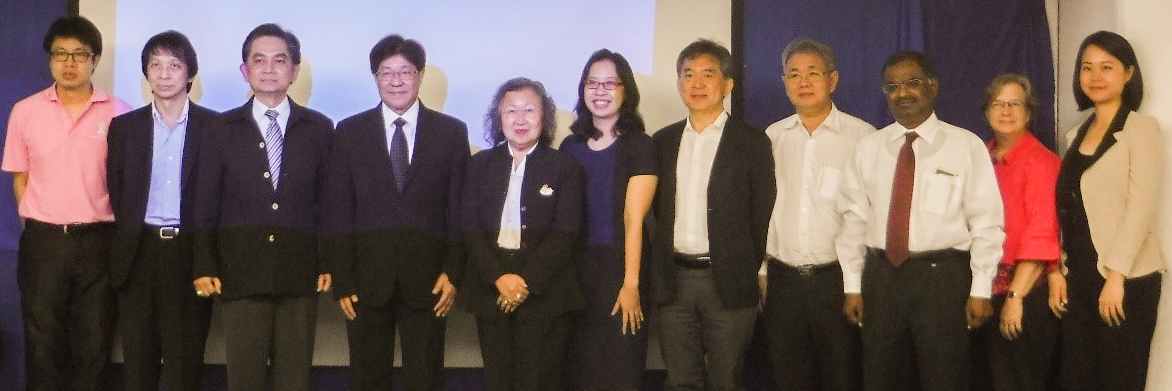Report - Workshop on ASEAN Energy Connectivity:
Energy Connectivity Scenario in Greater Mekong Subregion
September 9, 2016
| [Date] | September 9, 2016 9:30-12:00 |
|---|---|
| [Venue] | Energy Research Institute (ERI), Chulalongkorn University |
| [Language] | English |
| [Hosted by] | Policy Alternatives Research Institute (PARI, The University of Tokyo), Unisearch (Chulalongkorn University), Renewable & Appropriate Energy Laboratory (RAEL) of UC Berkeley |
| [Supported by] | Economic Research Institute for ASEAN and East Asia (ERIA) |
Program
| Opening speech by Prof. Hisashi Yoshikawa (UTokyo) |
| Keynote speech by Dr. Thanes Sucharikul (Chulalongkorn) |
| "Scope of workshop: GMS Energy connectivity" by Mr. Kensuke Yamaguchi (Chulalongkorn) |
| Coffee break |
| "Scenario making and energy modeling: case in South East Europe" by Mr. Noah Kittner (UC Berkeley) |
| "Focal point for scenario making: Pathways for GMS energy connectivity" by Daniel del Barrio Alvarez (UTokyo) |
| "Methodology on energy scenario making" by Dr. Sopitsuda Tongsopit and Mr. Vu Hoang Nghia (Chulalongkorn) |
| Discussion on going forward Moderated by Prof. Hisashi Yoshikawa |
| Closing remarks by Prof. Hisashi Yoshikawa |
Report
In the context of the ASEAN Economic Community (AEC), greater energy connectivity and integration is getting higher attention. In particular, the promotion of regional power trade in the Greater Mekong Sub-region (GMS) is at the forefront of this process. Member countries, with the support of international development institutions like the Asian Development Bank (ADB) and the World Bank, have conducted several studies and realized bilateral trade agreements. Nevertheless, a gap still exists until the achievement of a regional electricity market. Against this background, recent developments, such as the agreements for the creation of the Regional Power Coordination Center (RPCC) and for the power trade between Lao PDR and Singapore, are moving the process towards deeper integration levels. Therefore, now is the perfect timing to evaluate the options for the regional energy connectivity in the GMS.
In line with this awareness, PARI, the Renewable and Appropriate Energy Laboratory (RAEL) at the University of California, Berkeley (UC Berkeley), and Unisearch at the Chulalongkorn University held a joint workshop on September 9, 2016, with the aim of introducing a research plan and incorporating the perspectives of relevant regional stakeholders.
Prof. Hisashi Yoshikawa of PARI provided the opening remarks and gave a presentation of the research and activities. Dr. Thanes Sucharikul pointed out the relevance of the GMS integration for the ASEAN and provided a detailed description the existing legal mechanisms that could serve for that purpose, such as the ATIGA, AFAS, and the ACIA. While acknowledging the challenges ahead, Dr. Sucharikul expressed his hope that those are not insurmountable. Mr. Noah Kittner, research of RAEL at the UC Berkeley also participated via Skype. Mr. Kittner explained the SWITCH energy model utilizing an example from their recent work on South East Europe and the appropriateness of such methodology for the GMS. Mr. Kensuke Yamaguchi presented the project’s activities in three phases for the elaboration of the energy scenarios including the development of scenarios, their quantitative evaluation, and finally the development of policy implications. Mr. Daniel del Barrio Alvarez explained the relevance of the study on the possible pathways for energy connectivity in the GMS as a mean to approach the social trilemma in the region as a whole and for each member country individually. Dr. Sopitsuda Tongsopit presented the review of methodological approaches for scenario planning in order to allow the incorporation of relevant stakeholders’ perspectives. Continuing this presentation, Mr. Vu Hoang Nghia presented four different case studies to illustrate the overall flow of the process for developing energy scenarios.
Numerous regional stakeholders joined the brainstorming session including representatives from regional and national organizations as well as civil society actors and development partners. Relevant comments and meaningful comments and ideas were shared during the discussion session. The joint research team will continue meeting with them to keep them involved in the process. As a continuation of these efforts, a new regional stakeholders meeting will be held in Bangkok at the end of November.



